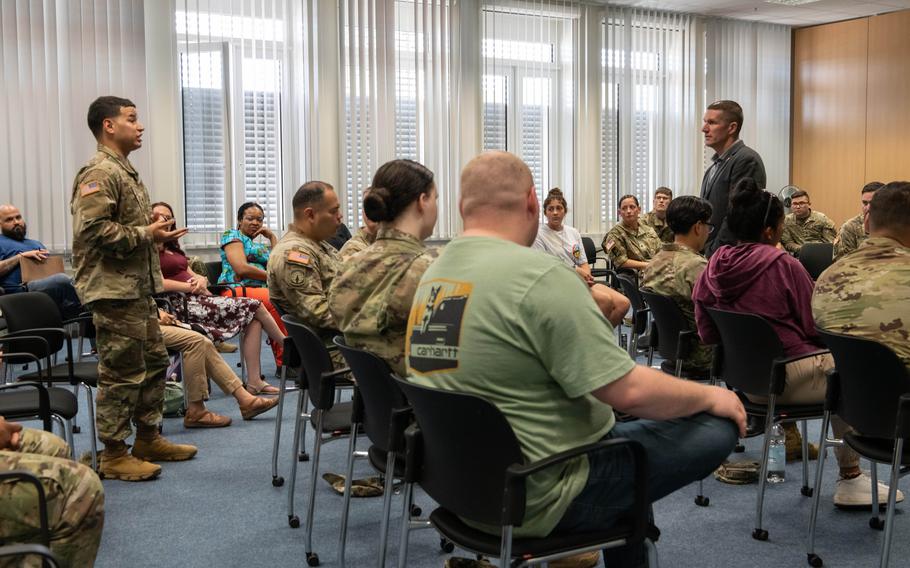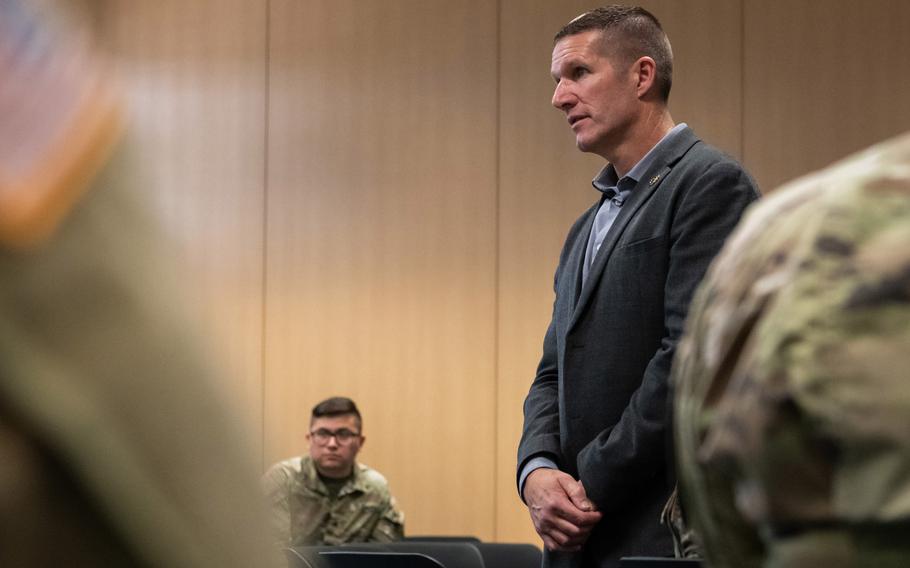
A soldier speaks with former Sgt. Maj. of the Army Daniel Dailey during a town hall meeting at Sembach Kaserne, Germany, June 22, 2023. (Phillip Walter Wellman/Stars and Stripes)
SEMBACH, Germany — Some potential recruits likely aren’t joining the Army because they think it’s become too “woke,” but the main reason the service is failing to attract enough people is because many remain unaware of the service’s full benefits, retired Sgt. Maj. of the Army Daniel Dailey said.
Speaking on the sidelines of a town hall meeting Thursday at the Sembach Army post in southwest Germany, Dailey said it was up to parents, teachers, influencers and others — not just recruiters — to encourage young adults to enlist and ensure the Army remains an all-volunteer force.
To make that happen, more civilians must be made aware of the opportunities provided by military service and the prevailing notion that attending college is the only pathway to professional success must change, Dailey said.
“Armies don’t build armies, nations do,” said Dailey, who argued it’s the responsibility of society at large to keep troop numbers up. “If our nation doesn’t start raising an Army, then we’re going to have a problem.”
The comments came after the Army fell short of its most recent recruiting goal of 60,000 by more than 25%, signing up fewer than 45,000 people last year.
The Army, Navy and Air Force all expect to miss their targets this year.
“Our problem is that we got to communicate to a broader audience,” Dailey said, adding while the military historically has been successful at recruiting family and friends of service members, it’s been less successful at attracting those with no links to the services.
Dailey, who served as the Army’s top enlisted soldier from 2015 to 2019 and is now the vice president of the Association of the United States Army, has been meeting this month with U.S. service members and their families in Germany on behalf of AUSA.
The nonprofit organization provides a range of support to soldiers and informs Congress and the American public about issues affecting the Army.

Retired Sgt. Maj. of the Army Daniel Dailey speaks with soldiers and their families at Sembach Kaserne, Germany, June 22, 2023. (Phillip Walter Wellman/Stars and Stripes)
Speaking to a few dozen people Thursday, Dailey said the opportunity to live and travel abroad was one of the biggest benefits of joining the Army, and many Americans were unaware of incentives like health care, schooling for family members and financial incentives.
Some of those benefits could use some improvement at the local level, according to some soldiers and spouses who spoke with Dailey on Thursday. Wait lists for child care have been a problem in the Kaiserslautern Military Community for several years and the dearth of jobs for spouses, many of whom are highly educated and experienced, is another enduring problem.
But overall, active duty and veteran benefits play a big part in attracting those in the know to the military. Dailey said he believes ignorance of those perks among the general population is impacting recruitment.
Army data published last year showed only 9% of Americans aged 16-21 expressed interest in serving in the military.
Earlier this month, Army Secretary Christine Wormuth told reporters that accusations by lawmakers and others that the Army had become “woke” also were hurting recruitment.
“That drip, drip, drip of criticism about a ‘woke’ military is having some counterproductive effects on recruiting,” Wormuth was quoted by Task and Purpose as saying. “We are a ready Army, not a ‘woke’ Army.”
“Woke” is a loosely defined term that often refers to diversity, equality and inclusion efforts. Critics say the military’s emphasis on supporting racial minorities, women and LGBTQ+ troops make it weaker and is causing recruiting to plummet.
Dailey, who has been a vocal supporter of diversity throughout his career, said he had to look up the term recently, and he still isn’t completely sure what it means.
“I think it’s probably a minute contributor to our recruitment problems, but I don’t think that’s largely our problem,” Dailey said. “It’s largely that we have to communicate the values of service to youth in this nation.”
Eligibility is also a big factor. A Pentagon report last year revealed 77% of young Americans would not qualify for service because of obesity, drug use or other problems regarding physical or mental health.
Regarding diversity, Dailey said he continues to believe that it’s the Army’s greatest asset.
“Diversity is good, it’s sustainable and it’s necessary,” he said. “We should strive to be a representation of our nation.
“Collectively, this nation is good at coming together, it’s proved that throughout history,” he added. “We need to stop trying to figure out what’s wrong with each other and start figuring out what’s right.”